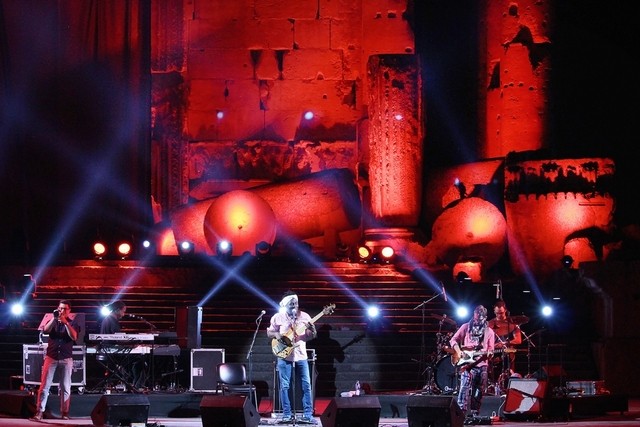
Josh Wood
BAALBEK, LEBANON // Not long after the sun fades from the fields of the Bekaa Valley, Cameroonian-born jazz bassist Richard Bona and his band launch into their set on the steps of the Temple of Bacchus. As thousands gyrate, clap and sing along to the music that skips between cultures, rhythms, genres and eras, the anxieties of present-day Lebanon melt away.
The Baalbek International Festival, at which Bona was performing on Sunday evening, was established in 1966 to bring top musicians, dancers and actors to the well-preserved ruins of the ancient city that the Romans called Heliopolis. The festival’s early years coincided with Lebanon’s golden age – the two decades leading up to 1975 – and saw greats such as American trumpeter Miles Davis, folk singer Joan Baez and queen of jazz Ella Fitzgerald play against the stunning backdrop of the Roman temples.
Lebanon’s 15-year civil war brought everything to a halt in 1975, and it was only in 1997 that the festival was revived. The annual spectacle has been clawing back its prestige ever since, attracting big artists like Sting in 2001, Massive Attack in 2004, and Phil Collins in 2005.
In more recent years, however, the festival has had to contend with a re-emergence of violence that has resulted in shows being cancelled or moved in three of the past ten festivals.
In 2006, Israel began bombing the country right before Lebanese singer Fairuz was set to play. And for the past two years, the festival has been moved to safer venues as Syria’s civil war spilt into Lebanon, destabilising the country – especially the Bekaa Valley where the government has long had a weak hold on power. Last year, the festival was able to hold three events in Baalbek before ISIL and Jabhat Al Nusra briefly captured the nearby border town of Arsal, forcing performances to be moved closer to Beirut.
Organisers say the festival is staying put this year. The security situation has not really improved significantly and tourism to the ruins at Baalbek has largely dried up, but the festival remains resilient and defiant amid adversity.
“I think the name of the Baalbek Festival is like a brand, a Lebanese brand,” says Nayla de Freige, president of the festival. “So I think it’s our duty to keep the name alive because the name is the symbol of telling that Lebanon is alive.”
While Bona’s quintet momentarily dragged the crowd away from the Bekaa Valley and its troubles on Sunday night, Lebanon’s problems can be clearly seen on the road there from Beirut.
In the hillside town of Bouwarij at the entrance of the valley, the low, bass din of artillery rumbles from just a few miles away across the Syrian border, where Hizbollah and the Syrian army are pounding rebels holed up in the town of Zabadani.
Over a glass of juice set to a soundtrack of shelling, a young villager warns a foreign journalist about the dangers – namely kidnapping, carjacking and robbery – of driving back from Baalbek late at night.
The road continues past the shacks of Syrian refugee camps, mansions built with drug money and posters of Hizbollah fighters killed in Syria.
Forays down secondary roads reveal acre after acre of cannabis fields and SUVs bringing Hizbollah fighters home from the front lines.
As the main road approaches Baalbek, state control is reasserted with armoured personnel carriers, Humvees mounted with .50-caliber machine guns, and soldiers posted every few hundred metres (though many of these disappeared the day after Bona’s concert). Traffic snarls at checkpoints. With thousands of concertgoers arriving from the more prosperous capital to watch Bona, Lebanon’s security agencies were not taking chances.
They have reason to be concerned. Five Czech nationals disappeared in the Bekaa last month, their passports and luggage found in an abandoned vehicle.



